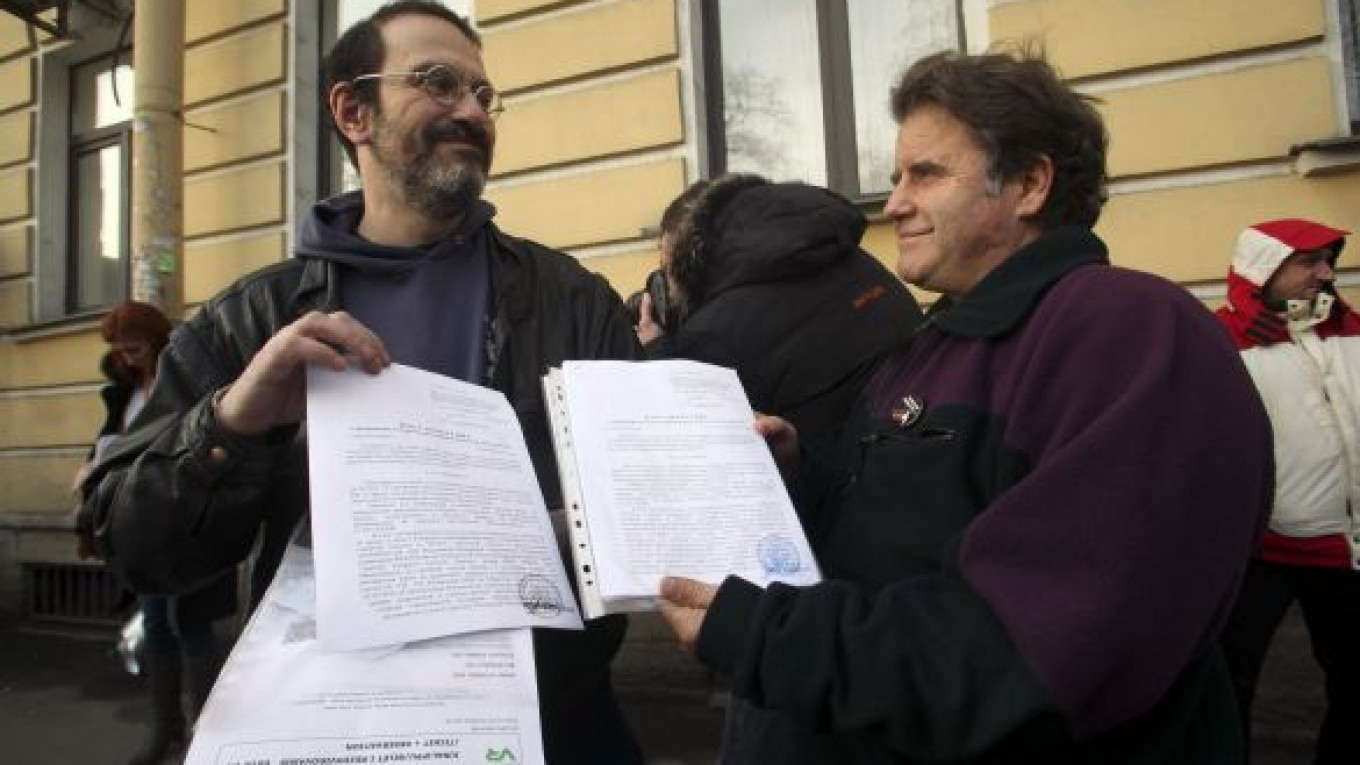As the last Greenpeace activist detained in the Arctic 30 protest received notification Thursday that he was cleared of all charges under a recently passed amnesty, several other international activists who had already been granted amnesty received permission to leave Russia.
The news marks the end of a saga that has seen activists of 19 different nationalities spend several weeks in Russian detention despite an international outcry over the case and Western demands to release the suspects.
Twenty-eight Greenpeace activists, as well as a Russian photographer and a British videographer, were charged with piracy — which was later changed to hooliganism — for staging a protest against oil drilling at Gazprom's Prirazlomnaya oil platform in the Barents Sea in September.
As of Thursday, seven members of the group had been granted visas from the Federal Migration Service, while others expected to receive their visas by the end of the week. Activists from countries that share a visa-free regime with Russia – Ukraine, Brazil, Turkey and Argentina – were allowed to leave the country immediately.
Greenpeace said it expected the case against the Arctic 30 to be closed and vowed to continue its campaign against oil drilling in the Arctic.
“We will not abandon our program in the Arctic. The story in the Barents sea will be taken into account. We are thinking about what the best way to continue our protest is – whether to keep it as tough as it was before or to choose a more moderate way. But the risk zone is clear for us now, people are of primary importance,” Vladimir Chuprov, head of the Energy program at Greenpeace Russia, said by phone.
“We have already sent four requests to the Prosecutor General's Office after Gazprom started drilling last week, and this is just the beginning,” he said.
One of the Arctic Sunrise crew members, Anthony Perrett from Wales, who was the first on Thursday to receive a visa from the Federal Migration Service allowing him to leave the country, told BBC Radio Wales earlier this week that he intended to carry on the campaign but would never do anything in Russia again.
Despite the news of the activists being able to return home for the holidays, many of them were frustrated that they would not be recognized as innocent, since the amnesty simply closed the case.
“Such a decision can't be considered fair,” Greenpeace International spokesperson Dmitry Litvinov said in a statement on Wednesday. “I'm happy to come back home but this is not the end of the story – the Arctic still needs to be protected.”
Denis Sinyakov, a freelance photographer who was on assignment when he was arrested together with other crew members, wrote on Facebook that he did not want to accept the amnesty because it implied that the charges against him and the others were fair. He said he was forced to accept the amnesty by investigators who told him there would be a new case if new evidence appeared in the future.
“According to Russian law, there is always a chance the case will be reopened or a new case will be opened because of new facts. It is not clear why investigators are intimidating Greenpeace people with that,” Anton Beneslavsky, one of Greenpeace's lawyers, said by phone.
He said the amnesty did not mean that the crew members had admitted guilt, since the only document they needed to sign was their consent to use the amnesty to stop prosecution against them.
Greenpeace is expecting the case against its activists to be closed in the coming days and all the equipment, including the Arctic Sunrise ship, to be returned to the organization.
The Arctic Sunrise is currently under arrest in Murmansk. Beneslavsky said that it would likely to be released only after the New Year's holidays.
Contact the author at e.kravtsova@imedia.ru
A Message from The Moscow Times:
Dear readers,
We are facing unprecedented challenges. Russia's Prosecutor General's Office has designated The Moscow Times as an "undesirable" organization, criminalizing our work and putting our staff at risk of prosecution. This follows our earlier unjust labeling as a "foreign agent."
These actions are direct attempts to silence independent journalism in Russia. The authorities claim our work "discredits the decisions of the Russian leadership." We see things differently: we strive to provide accurate, unbiased reporting on Russia.
We, the journalists of The Moscow Times, refuse to be silenced. But to continue our work, we need your help.
Your support, no matter how small, makes a world of difference. If you can, please support us monthly starting from just $2. It's quick to set up, and every contribution makes a significant impact.
By supporting The Moscow Times, you're defending open, independent journalism in the face of repression. Thank you for standing with us.
Remind me later.






